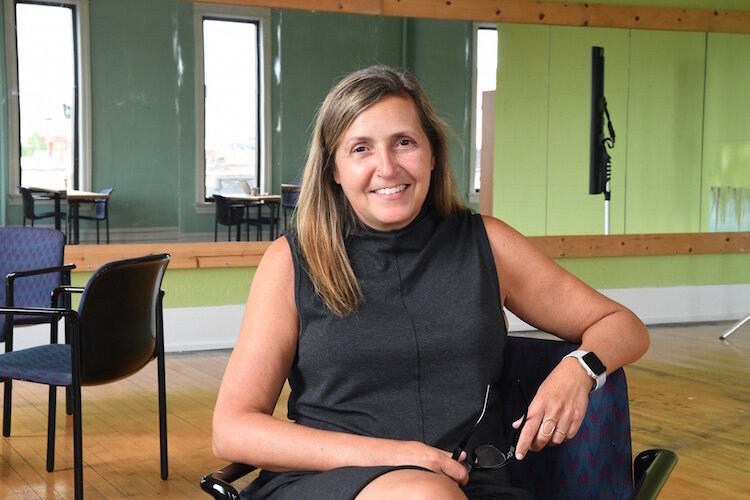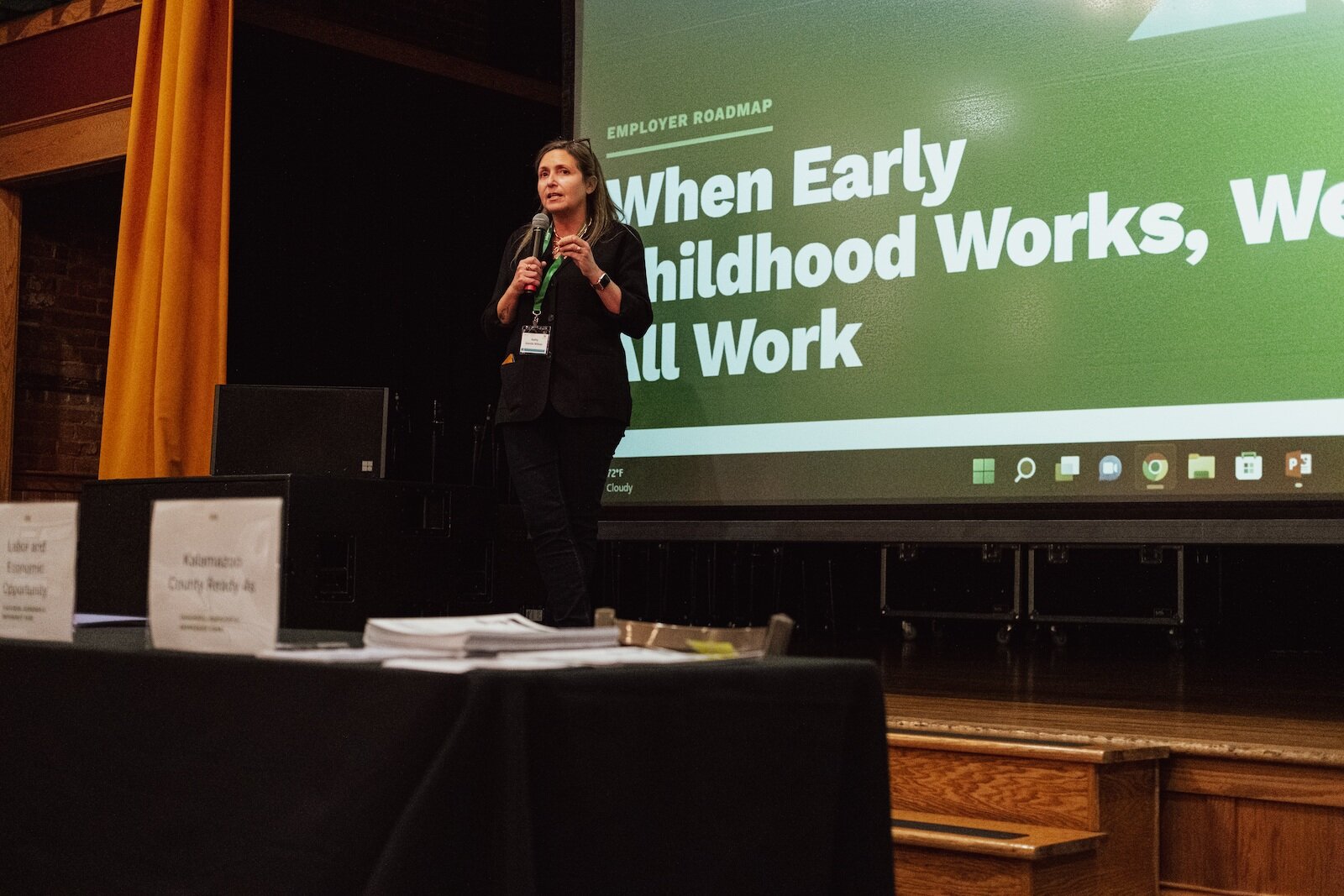Battle Creek Pulse receives childcare investment grant
In Michigan, the average pay for a Child Care Worker is $30,047 a year and $14 an hour and the average salary range for a Child Care Worker is between $23,406 and $34,343. “Childcare itself is not a money-making venture. Many of our childcare providers live in poverty and often without benefits,” says Kathy Szenda Wilson, co-director of Battle Creek's Pulse, which will use the grant money to help support childcare providers.
One out of every eight employees is searching for childcare and 62 percent miss at least one workday each month because of issues related to their childcare, according to results of a survey conducted with three large local employers.
These local employers are referred to as “Our Battle Creek Champions” by Kathy Szenda Wilson, co-director of Pulse, which works to increase child care supply and advance best practices at the regional and state levels, as well as helps employers to navigate childcare opportunities. Their work is funded through a grant from the W.K. Kellogg Foundation of the Upjohn Institute.
“The Upjohn Institute is the grantee and (Pulse) is the project,” Szenda Wilson says.
On March 10 Governor Gretchen Whitmer announced that Pulse, formerly known as B.C. Pulse is the recipient of a $150,000 grant from the Early Childhood Investment Corporation, the state’s focal point for early childhood issues. Pulse was one of 16 organizations to receive the Regional Child Care Planning Grant and the lone grantee in southwest Michigan which is part of the Michigan Economic Development Corporation’s Region 8. A full list of grantees is in the release announcement.
In making the announcement, Whitmer says in a press release that, “Child care is the backbone of our economy,” In announcing the $2.4 million in grants, Whitmer said, “Access to quality, affordable child care supports parents as they go back to work, ensures kids have the support they need to grow into their best selves, and helps businesses hire, recruit, and retain talent.”
Szenda Wilson says the grant will help Pulse and its regional partners develop a comprehensive plan to address the childcare crisis. She says this will involve meetings with economic developers, local government leaders, families, childcare business owners, and community-based organizations to understand the childcare landscape, explore best practices, research opportunities, and develop strategies.
Between now and the end of May, the Pulse team will be focused on surveying families who are either seeking or have childcare to find out what their challenges are. The data collected from these surveys will be used to shape discussions that will happen at the meetings beginning in June that also will include stakeholders such as area employers and the owners of local childcare businesses who also will be discussing their needs and challenges.
Although the number of employers participating in the convenings is yet to be determined, Szenda Wilson says Pulse will be working with economic developers to get data that will be used as an overall plan is created. She says, “We have enough champions locally that we could lean on like NextThermal, Bronson, and Duncan for the employer perspective. This group is committed to doing something. They have remained thoughtful and patient to help people see what’s possible.”
Each of the Regions is responsible for creating a comprehensive landscape of childcare and what the supply and demand look like and developing collective strategies to address the gaps, Szenda Wilson says.
“We are also helping economic developers to understand what their role is in addressing the childcare crisis and how they’re supporting employers,” she says. “We have to create a more comprehensive view of what it takes to address the childcare challenge we already face.”
In addition to these local stakeholders, the Michigan Economic Development Corporation and the Michigan Department of Education are also involved in this work as part of Whitmer’s Caring for MI Future initiative.
The Early Childhood Investment Corporation received $12.5 million in federal American Rescue Plan Act funding in August as part of Caring for MI Future — a $100 million investment to help more Michigan families find quality, affordable child care in their communities, says a press release from Whitmer’s office.
“The state intends for the investment to dramatically increase access to childcare across Michigan and to spur the opening of 1,000 new or expanded child care programs by the end of 2024,” says the press release.
In the ongoing discussions that Szenda Wilson has about the state’s childcare crisis and efforts to address it, she frequently mentions the need for a political and corporate will to make it happen.
Evidence that this political will may be taking root could be found in Whitmer’s most recent budget with the inclusion of the MI Tri-Share Michigan. Through MI Tri-Share, the cost of an employee’s child care is shared equally among the employer, the employee, and the State of Michigan — a three-way split — with coordination being provided regionally by a MI Tri-Share facilitator hub.
While calling MI Tri-Share an “incredible asset” and a “valuable tool” for families, it is limited to families living at or below the ALICE (Asset Limited, Income Constrained, Employed) threshold which means higher wage earners don’t qualify for it. This leaves a gap in childcare access for people earning just over the ALICE threshold, Szenda Wilson says.
However, this access is impacting workers at all income levels. In Calhoun County, the number of children for one childcare slot is 1.8 with the most glaring disparity in Cass County which has one slot for every 4.3 children.
Szenda Wilson says the lack of childcare in rural areas is much worse than in urban areas. She says the shortfalls in both urban and rural areas can be directly tied back to the owners of childcare businesses who continue to be underpaid, undervalued, and not seen as legitimate business owners.
In Michigan, the average pay for a Child Care Worker is $30,047 a year and $14 an hour and the average salary range for a Child Care Worker is between $23,406 and $34,343, according to the Economic Research Institute.
Individuals earning $29,160 are considered to be at 200 percent of the 2023 Federal Poverty Guidelines.
“Childcare itself is not a money-making venture. Many of our childcare providers live in poverty and often without benefits,” she says. “We need to work on the childcare business owners’ side to help them achieve their role as childcare business owners who have a right to the same economic development tools as other businesses do.”
Although the pandemic exponentially heightened the awareness about a childcare crisis that already existed, Szenda Wilson says she wishes stakeholders would have done more to seize that moment. She hopes that Pulse’s work to gather input and identify resources will lead to a comprehensive plan that will elevate the needs and solutions.
“I hope that our plan results in us identifying and leveraging existing resources and creating new ones. We want people to see what role they can play in this and actually do it,” she says.

















